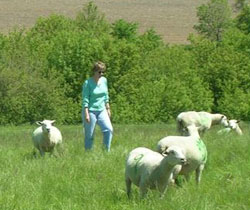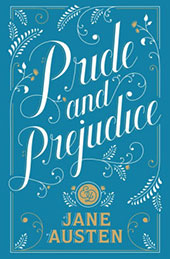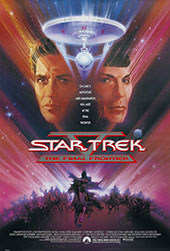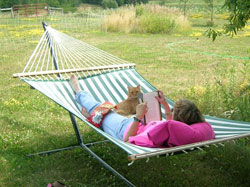
Q & A
Why write memoir?
I used to think that memoir was only for famous people, but that’s totally changed over the last twenty years. Memoir can be written by anyone who’s had anything go wrong in their lives, since who wants to read about the perfect life? Not me. I wasn’t drawn to memoir, but sort of fell into it as therapy. When Melissa and I started the farm, lots of stuff went wrong. I just couldn’t believe how bizarre my life had become, so to deal with this, and sort out how I felt about it, I began writing things down. I brought a short piece to my writing group, and when they laughed, I was hooked. I wrote another, and another, and ended up with a memoir.
Memoir is an odd duck because it’s not autobiography. It’s creative nonfiction, which means the writer must creatively shape a series of events into a pleasing and cohesive tale, without altering the truth. This doesn’t mean things are made up. Sadly, all the events in my memoirs are true. But are the events in the exact order as they occurred? Not necessarily. For example, the events in Hit by a Farm stretched out over six years. I initially wrote it that way, but upon a second reading, I decided that anyone who took that long to figure things out was an idiot. To avoid appearing so, I shortened the book’s time frame to around four years. Now I just come off as a semi-idiot. This is why I love creative nonfiction. Memoir is reality that has undergone a few nips and tucks, gentle cosmetic surgery to eliminate the boring parts.

What writers have influenced your writing?
Carl Hiaasen. Dave Barry. Bill Bryson. Christopher Moore. These guys are funny, and while my voice doesn’t match their over-the-top style, I admire their work.
Diana Gabaldon, for showing me that it’s possible to mix genres and have fun doing it.
The Bronte sisters, for being brave and revolutionary at a time when few told the truth about womens’ lives.
Jane Austen, for her intense romantic tension, Pride and Prejudice for example.
Please describe the process you use to write a book.
I read as much as I can on the topics, location, culture, issues that a book might encompass. I love immersing myself without the pressure of having to know how I might use the information. It’s tempting to start writing at this point, but invariably those attempts fail. I do better if I read and think until I fear I’ll burst, then I put aside the research and begin writing.
I prefer to map out where I’m going. This isn’t an outline, but a rough sketch of the scenes that might be in each chapter. As I write, these change and shift, so I try not to get too invested in the original plan. I make this map because, unlike many writers, I need to know where I’m going before I start. I always have, playing in my head like little movies, the opening scene, the key turning point scenes, and the ending. Writing those scenes are my rewards for writing all the rest.

What's it like being a writer?
It’s fun to wear sweat pants all day and not have to comb your hair or worry about spinach in your teeth after lunch. On the other hand, it can get lonely being at home day after day. I set a schedule, and am pretty good about sticking to it. Without a schedule, my days could easily deteriorate into watching Star Trek movies or the Colin Firth/BBC Pride and Prejudice series or the Richard Armitage/BBC North and South series, and eating bowl after bowl of popcorn (popped in coconut oil. Yummm.) I know this because, on occasion, that’s exactly what has happened. Being creative all the time is not only hard, it’s impossible, so my brain needs some down-time.
But I do show up in my office nearly every day, and do my best to move forward on my current project, even if it’s just a few paragraphs. Writers don’t have weekends. We write all the time, even if there isn’t a pen in our hands.
What are the benefits of writing in different genres?
I’m never bored. Ever. And I can see firsthand that all writing boils down to a great story, whether it’s true or made up, whether it’s romantic or funny or serious, whether it appeals to adults or to children. I like the cross-pollination that happens when one uses a fiction plotting device to structure a nonfiction book, or uses a tool for strengthening a picture book to improve a novel.
What are the drawbacks of writing in different genres?
I don’t really have a ‘platform,’ something a truly successful author needs. Also, as a writer, I end up feeling as if I’m on the fringes of lots of author groups, instead of actually part of them. Poor me. The upside, of course, is that this gives me plenty of opportunity to polish up my self-pity.

Where do you write?
In my office. In my living room. In my hammock. On my little front deck. In the car. In the shower. At the local bakery, (although the glazed old-fashioned doughnuts are too tempting, so I can’t go there anymore.) The weirdest thing is that I cannot write in a library. I can’t focus. The shelves and shelves of books are too distracting. I love walking the aisles, tipping my head to better read the titles. It’s the best way to encounter books you’ve never heard of before, but that you really, really need.
What do you write with?
First drafts I prefer to write in pencil. I wrote two novels that way, and kept the stubs. Eighty pencils gave their lives for The Spanish Pearl and The Crown of Valencia. Once the first draft is done and entered into the computer, then I print out drafts, edit on paper, then correct on the computer. I know it’s old-fashioned, but my editing is stronger when I get away from the computer. I also like to buy blank books and write in those.
What's your favorite part of the writing process?
The beginning of a book is my favorite. It’s like falling in love. You glow with limerance, the state you enter when you fall in love.
However, the middle of the process is also my favorite because revision is such an intriguing challenge. You have a manuscript that falls considerably short of the image you had of the book. Now you must find clever and creative ways to chip away at that manuscript until you release the book you know is in there.
That said, the end of the process is my favorite, because of the almost intoxicating sense of relief and accomplishment. I have a new book, and, even more importantly, I’ve survived. As George Orwell said, “Writing a book is a horrible, exhausting struggle, like a long bout of some painful illness.”
What's in your office?
A mess, I’m afraid. I clean it at the end of a project, but I should really clean more often. I have windows on three sides, with two giant oak trees and one of Red Wing’s river bluffs in view. Now and then a local hawk likes to sit on the long, horizontal branch outside one of my windows to disembowel his meals. Ah, nature.
I have a white IKEA desk, a separate computer desk, and a very cushy red chair that I rarely get to use because our 100-pound dog Lucy has claimed it for her own.
I have an art table with an easel, lots of pastels on the table, and a few on the floor that have rolled out of reach. My office used to be a second story screened-in porch connected to a small room, so that small room is now part of my office. It contains lots of books, lots of yarn, and a massage table we use as an exercise bench. (If you’re a massage therapist, don’t worry—we are being gentle with it.)
